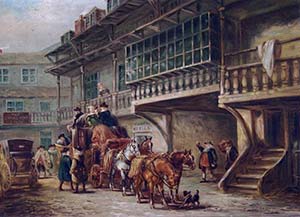Coaching Inns
Charles Dickens describes the excitement at the arrival of a coach at an English coaching inn
Taken from Sketches by Boz - The Great Winglebury Duel

Oxford Arms Inn-Warwick Lane, London by John Charles Maggs 1910
The day was hot and sunny, the town in the zenith of its dulness, and with the exception of these few idlers, not a living creature was to be seen. Suddenly the loud notes of a key-bugle broke the monotonous stillness of the street; in came the coach, rattling over the uneven paving with a noise startling enough to stop even the large-faced clock itself. Down got the outsides, up went the windows in all directions; out came the waiters, up started the ostlers, and the loungers, and the post-boys, and the ragged boys, as if they were electrified – unstrapping, and unchaining, and unbuckling, and dragging willing horses out, and forcing reluctant horses in, and making a most exhilarating bustle. ‘Lady inside, here,’ said the guard. ‘Please to alight, ma'am,’ said the waiter. ‘Private sitting-room?’ interrogated the lady. – ‘Certainly, ma'am,’ responded the chambermaid. ‘Nothing but these 'ere trunks, ma'am?’ inquired the guard. ‘Nothing more,’ replied the lady. Up got the outsides again, and the guard, and the coachman; off came the cloths, with a jerk - ‘All right’ was the cry; and away they went. The loungers lingered a minute or two in the road, watching the coach till it turned the corner, and then loitered away one by one. The street was clear again, and the town, by contrast, quieter than ever (Sketches by Boz, p. 405-406).
Key-bugle - Horn blown by the coach guard on approaching the inn as an alert to make ready for a change of horses.Outsides - Passengers sitting on top of the coach as opposed to inside. Outside seats were cheaper.
Ostler - Or hostler, a man employed to look after the horses at an inn.
Post-boys - Man who rode one of the team of horses pulling a coach. Used in place of a coachman.
Ragged boys - Students at a local Ragged School (charity school for the poor) used for misc odd jobs at the inn.
 Copyright © 1997-
David A. Perdue, All Rights Reserved.
Copyright © 1997-
David A. Perdue, All Rights Reserved.